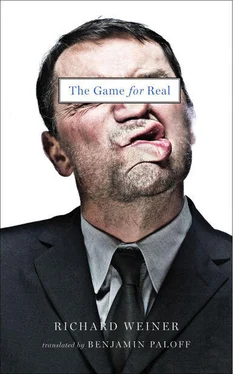There one awaits the express to Paris. The little train pulls into the station, still not entirely awake. Under a low, yet already promising sun, the chaotic optimism of a September morning, which befriends the sleepers returning to cities from their vacations. The tracks awaken to their infinitude with such enthusiasm it’s as though they’ve discovered it today for the first time. It has dawned on the warehouses that they are significant and anonymous, they’re even beginning to attain a barbarian beauty. A platform full of people. They marvel at the reassuring sense of their solidarity, but they marvel even more at the fact that they haven’t discovered the reason for this sureness: yet it’s as delectable as an ample vacation breakfast in the mountains. — So far, nothing has yet shattered this superhuman concord, but a spry inkling that there was worldly disorder nearby has already snuck in; it’s imponderable and pronounced. Heads turned to the right as if on command. The train was still far away down the ruler-straight track, so far away that they guessed its arrival not so much by the black point into which it withered, but by the overbearing white plume with which it announced itself, and the immense din of this as-yet unheard announcement was such that it overpowered everything, everything and everything. It was the din of an obstinate and disciplined dominance that subjugates while reassuring and ennobling. You might think of the Pax Romana : that’s sort of how it was rushing, at the head of proud and perceptive legions. A throng of latecomers descended onto the platform. Boys and girls. They were laughing and shouting. One, large, proud, with straight chestnut hair, is next to him, dancing, stepping back. He was dancing his courage, but he was dancing it for one of the girls (you could immediately tell), and you could tell immediately which one. It was the one who, being too happy, was the only one brooding: her conquest was still a flower unto itself; it had happened last night. The platform was now entirely subject to the onrushing train-tyrant, beside whose arrival there was nothing in the universe at this moment that would be “worthy”; and on the platform the shouting throng, for whom the only thing “that’s worthy” was last night, because that’s when the two had met; this was a cluster of the free within a crowd of the enslaved. They alone were not waiting. They were going to meet the emperor, who was coming to meet them. The carefree among the solemn, the unhurried among the bustling, they roared and skipped all the more provocatively for being oblivious. The train! If they miss this one, they’ll catch the next. The nine-thirty train’s as good as the eight. They cared about the direction, which is invariable, not about the trains, which are innumerable.
The locomotive was coming in on the first track; it was only inadvertently — for the rambunctious group fascinated him— that he’d caught sight of the train’s eccentric, wheels, and rod. A fleeting dissatisfaction: that the relationship between the dizzying speed of arrival and the nearness of the goal, where that speed would be impressively renounced, seems incongruous to him, as always. — He’s lost sight of himself. The cluster dashed for the car it had arbitrarily selected; it dashed as though betting on a lottery number, knowing that there was no reason not to bet on any other number: that’s why, by all that is holy, it won on just the number it had bet on. The train exerted all its will and worked itself down to a spare trot. He saw it all, waiting for the door that would stop in front of him. Why run after the car he’s selected when there’s one, when there’s surely one that will stop right in front of him? Why bet if he knows for sure that he has to win something ? He was standing here, waiting, disengaged, for it was to no purpose. And while he was waiting thus, that is, waiting while awaiting nothing, all of a sudden he discovered, just as we discover something that doesn’t concern us, that he was unhappy.
No, he didn’t discover his unhappiness so much as that he was unhappy . He beheld it with all his senses, each of which had as though assumed additional sight — perhaps to compensate for some enigmatic virtue of his.
He beheld it out of the blue, having anticipated anything but just this. It was a surprise for which amazement failed. He beheld that he was unhappy. He beheld it like a thing that is quite peculiar, though by no means awful; a thing apart from everyday reality, yet not at all imagined. It was a vision, but so cohesive that it outlasted even the shock of physical torpor, that is, the moment when he stepped forward to board. This thing — that is to say: that he was unhappy — gripped him, even though it accompanied him like a trusted friend, even though, like an atmosphere, it had became his environment, even though he carried it with care and respect.
The express had already departed again; with a tread each time more drawn out and pinioned. At last it took a shot at levitation, and a lucky one; it encouraged it with the bribes of intermittent bounces off its soles. The train became a self-confident gale. Now, once again, there was nothing besides the rumbling that had begun somewhere where individual destinies had ceased, and that would become somewhere where any destiny could emerge. The travelers’ past had been obliterated, they had not yet arrived at the future that would sort them all out again: they were for the most part from among the favored, each one empowered by all the others, and their lack of skepticism was multiplied by their glee. — He, too, was aware of this, but only as information. Yet what he knew was that he was separate from that simultaneously destructive and unifying solidarity. There is no centrifugal force powerful enough to part him from the broodingly unexcited phantasm “I’m unhappy.” There is no centrifugal force that would pull him back into that forgotten self, like a Segner sprinkler spouting from a spinning wheel of destinies that had ceased being destinies. He is apart, unsociable, monstrous.
These monotonous testimonies! He’s asked his neighbor whether he might place his attaché on top of his thick rucksack. He has to depend on someone: he was coming off as affable, he even borrowed a smile (from where?); he sought his neighbor’s eyes so obtrusively that he found them, but in vain: consent was mumbled; the eyes, averted. And the person opposite him, a lady whose lips prepared so many times to ask a question, which she finally took to the adolescent, though he was sitting so far away! (It was just the one who’d been dancing for that happy throng; he replied — astonishingly! — so politely, obligingly, and almost sadly.) And the talkative conductor who misheard his query, as though professionally; his query alone. . Right. .
That he’s unhappy is a limpid phantasm, and it is also he: the two, inseparable. He’s not scared of it. As a companion it is seldom encouraging, but that it would weigh him down: no! — It searches patiently, ransacks itself, digs into itself, thinking itself simultaneously both the soggy finger and the fisherman who wants to find earthworms in there, and the more, the better; it searches the worm-soil, and with so certain a certitude that it actually is wormy, with such sullenly sincere zeal for finding itself that it has to guard against self-congratulation for so great an ardor: well no, not really, as many worms as it seems it finds there, it’s nothing against how many it won’t find; not even close. It’s just: where, where do they come from, all these misunderstandings, disagreements, losses? Where is it from, that unbridgeable hiatus between what he says and actually does and what can be heard and seen from his words and actions? Between what he’s intended and what he’s expressed? Between what he’s wanted to do and what he’s had to do? Where? From this thing that materialized so suddenly, transparently, and convincingly amid the screeching of the axles and the racket of cheerful country youths, from this thing so immaterial yet existing, from this thing shining with a kind of faint, stable, and interior moonlight, from this serious, real, calm, and collected thing. How to begrudge, how to bemoan an attribute so loyal, constant, and innocent! More and more he sees that he is unhappy. But no, that’s not really how it is; the fact that he’s unhappy — this thing made for his sake already long ago and decreed once and for all — he sees with increasing clarity, subtlety, persistence, and bitterness, but astonishingly he sees it bitterly without having experienced its bitterness, without a grudge, without bemoaning or lamenting. That’s how it is. It is neither weirder, nor more unfair, nor more hopeless than being happy, deserving, or famous, it’s pretty much like being loved by someone. That’s how it is. That’s how it is: this is his world, his share, his reward. The sun of his day and the stars of his night. And because it is so, all he needs now is to make a rather slight effort: to say “yes,” and from the fact that that’s how it is something even more cosmically positive will emerge, something that could not and cannot be anything else. . and that’s all there is to say.
Читать дальше












